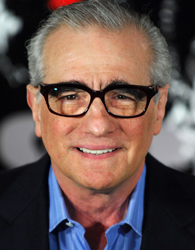“It’s easy to think of Scorsese as a kind of poet of the underworld,” the American Film Institute reflected when they granted him a Lifetime Achievement Award in 1997. Raised on the streets of New York, director Martin Scorsese has shone a visionary light on the darkest of scenes and characters.
Martin Scorsese’s Early Days
Martin Scorsese was born on November 17, 1942, in Queens, New York. He grew up in Little Italy, on the Lower East Side of Manhattan. In an interview with PBS, Scorsese describes his life on Elizabeth Street as reminiscent of life in an Italian village. But he also notes that the street was divided up based on people’s villages of origin; there was a great deal of tension among people who lived in various buildings on the street. He describes the figures that colored his childhood, and says that many of them, including the neighborhood butcher, have made appearances in his films.
Scorsese’s childhood in Little Italy provided him with the inspiration for his first notable success, the 1973 movie “Mean Streets,” which contrasts life on the street with a life devoted to the church. His own interest in film arose because he was severely asthmatic as young boy. Unable to spend time playing outside, he found a haven in movie theaters and developed a passion for film.
This passion was put aside when he himself nearly entered the priesthood. He attended a seminary, but dropped out and enrolled as a film major at New York University. He continued on there to get a master’s degree in film directing and began his career with short films. With “Mean Streets,” he broke out as a full-length filmmaker and followed up with two more well-received movies, “Alice Doesn’t Live Here Anymore” (1973) and “Taxi Driver” (1976).
Sources in this Story
- PBS Interview Gallery: Martin Scorsese
- National Endowment for the Humanities: Martin Scorsese Biography
- Britannica Online Encyclopedia: Martin Scorsese
- All Movie: Martin Scorsese: Biography
- MovieMaker: Martin Scorsese’s Comfortable State of Anxiety
- IMDb: Awards for Martin Scorsese
- American Film Institute: AFI Lifetime Achievement Award: Martin Scorsese
- The Atlantic: Why Netflix Will Release Martin Scorsese’s Next Film
Scorsese’s Notable Accomplishments
“Mean Streets” and “Taxi Driver” marked the beginning of a collaborative relationship between Scorsese and actor Robert De Niro, which has continued for years. Scorsese went on to direct De Niro in “Raging Bull” (1980) for which the actor won an Academy Award.
Bolstered by the box office success of 1986’s “The Color of Money,” Scorsese turned to a far more controversial project, “The Last Temptation of Christ.” Many were offended by the film’s portrayal of an uncertain Jesus (played by Willem Dafoe) who briefly considers having a family with Mary Magdalene, and the movie was banned by some theaters.
Scorsese rejects the label of “artist.” He certainly knows that making movies is a business, not merely an artistic endeavor; two films that followed “Last Temptation of Christ”—“GoodFellas” and “Cape Fear”—were specifically intended to be commercial successes. Always willing to explore different themes and genres, Scorsese’s eye for drama and cinematography have made him a success as both a director and a screenwriter. Although he has only won one Academy Award himself, he has dozens of other nominations. A full list of Scorsese’s awards can be found on IMDb.
In 1997, he won an American Film Institute Lifetime Achievement Award. The AFI commended Scorsese not only for his work as a director, but his continued enthusiasm and devotion to film history, which he has taught at NYU and continues via work with the Film Foundation.
The Man and his Work
The Rest of the Story
Scorsese continues to direct movies to critical and audience acclaim in a diverse range of genres. Years after making a legendary documentary about The Band, “The Last Waltz,” he returned to the world of music to make “Shine A Light,” a concert documentary about the Rolling Stones.
As of 2017, he was working on a movie called The Irishman that was to be distributed by Netflix.
This article was originally written by Rachel Balik; it was updated November 18, 2017.











